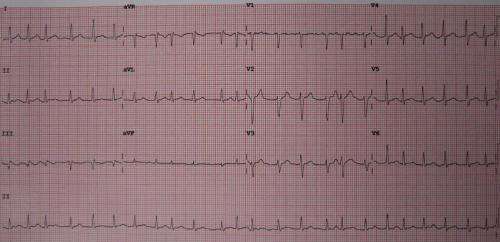
Patients with chronic kidney disease and Type 2 diabetes who took the experimental drug finerenone were about 30% less likely to develop the heart rhythm disorder atrial fibrillation (AFib) than those taking a placebo, according to data presented at the American College of Cardiology’s 70th Annual Scientific Session.
Last year, researchers reported that the trial, called FIDELIO-DKD, met its primary endpoint showing a significant benefit of finerenone, a nonsteroidal, selective mineralocorticoid receptor antagonist, in terms of a composite of sustained decrease in kidney function, kidney failure and renal death. The new analysis reveals that patients derived these benefits regardless of their history with AFib and suggests that taking finerenone also reduced the rate of new-onset AFib.
“Finerenone can lower the risk of development of atrial fibrillation in patients with chronic kidney disease and diabetes and can be used as a therapeutic strategy to delay its onset,” said Gerasimos Filippatos, MD, from the National and Kapodistrian University of Athens, School of Medicine, Attikon University Hospital in Athens, Greece, and the study’s lead author. “It can also protect the heart and the kidney from further damage caused by chronic kidney disease and diabetes in these patients with or without pre-existing atrial fibrillation.”
Chronic kidney disease, diabetes and AFib are major public health concerns worldwide. Patients with chronic kidney disease and diabetes face an increased risk of developing AFib because these conditions can cause changes in the heart’s structure and electric signaling, leading to fast and erratic heart rhythms. During preclinical studies, finerenone was reported to slow these structural changes.
FIDELIO-DKD randomly assigned 5,674 patients with chronic kidney disease and diabetes to take finerenone or a placebo and tracked outcomes for a median of 2.6 years. The primary endpoint was a composite of kidney failure, renal death or sustained decrease in estimated glomerular filtration rate (a measure of kidney function) of 40% or more from baseline. The key secondary outcome included death by loss of heart function, nonfatal heart attack, nonfatal stroke or hospitalization for heart failure.
As previously reported, finerenone significantly lowered the risk of kidney events by 18% and the risk of cardiovascular events by 14% compared with placebo. For the new analysis, researchers assessed outcomes among patients with and without a history of AFib or atrial flutter (about 8% of participants had AFib or atrial flutter at the start of the trial) and the risk of patients developing AFib or atrial flutter during the study.
The results found the primary and secondary endpoints were significantly lower in patients taking finerenone regardless of their AFib status at the start of the study.
“The previously-reported kidney and heart protection with finerenone applied equally to patients with and without pre-existing atrial fibrillation,” Filippatos said.
In addition, new-onset AFib or atrial flutter was reported in 3.2% of patients taking finerenone and 4.5% of those taking a placebo, a significant difference in favor of finerenone.
Researchers said that previous findings from preclinical studies have suggested that finerenone may help reduce scarring and thickening of the heart tissue, possibly through its action of blocking mineralocorticoid receptors, a type of protein molecule present on many cell types in the heart and kidney that has been shown to be especially abundant in patients with AFib.
“Preventing or delaying the onset of atrial fibrillation in patients with chronic kidney disease and diabetes is particularly important since having atrial fibrillation can worsen chronic kidney disease and having diabetes can worsen atrial fibrillation symptoms,” Filippatos said. “Treatment in these patients can also be challenging because they are prone to developing blood clots [which can lead to stroke] and bleeding. Finerenone has the potential to reduce the burden of atrial fibrillation in these patients.”
Source: Read Full Article
